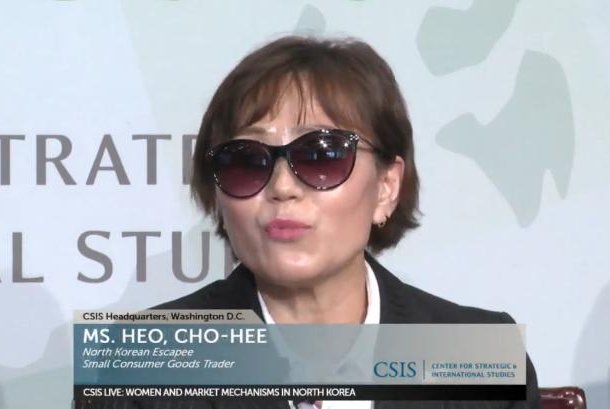Heo Cho-hee, a North Korean defector, said she struggled to make a living selling cigarettes on the streets of Chongjin. Heo and other women wore dark sunglasses on Monday, while speaking at a forum on North Korea at the Center for Strategic and International Studies in Washington. Screenshot by Elizabeth Shim/UPI
NEW YORK, April 29 (UPI) -- Markets have rapidly expanded in North Korea but working on the boundaries of the regime's laws is a high-risk business, a group of women defectors said Monday.
Lee Hyo-joo, a defector who says she has traded in diesel oil, said those who traded the fuel without authorization were executed.
"It was a very risky business to steal diesel oil, because it was a 'present' from Kim Jong Il to the people," Lee said. "But the returns were so profitable."
The defector said she risked her life to sell the commodity after struggling in trades that yielded little profit. Lee said she turned to more dangerous activities to make a living in the impoverished country.
Lee and the others, speaking at a forum on North Korea at the Center for Strategic and International Studies in Washington, wore dark sunglasses onstage to shield their identities. All women agreed North Korean markets are the lifeblood of the economy and that women, not men, are the key agents of change.
The important role women have played in marketization has not translated into improved rights, however.
North Korean women became the main drivers of market formation because men are closely monitored at their workplaces or the military. But unmarried women are not allowed to become vendors, Lee said.
Heo Cho-hee, who struggled to make a living by selling cigarettes on the streets of the northeastern city of Chongjin, said she had to wander because she couldn't afford to pay for a space at the local market.
"Even in the late '90s, North Korea was becoming a capitalist society, where those with money survive," Heo said, adding traders without the financial means to pay bribes would "starve."
Paying off North Korean police officers could also come in handy when they chose to confiscate a vendor's merchandise or take their earnings. Market raids were common in the earlier days, Heo said.
"Over time, North Korean women became stronger and more determined to overcome challenges," Heo said. "The survival of the whole family rested on women's shoulders."
"On top of that, there were so many petty thieves who stole things from us."
More popular than Kim Jong Il
North Korean markets have a longer history than previously thought, and date back to the '70s when the country was under the leadership of founder Kim Il Sung, said Kim Ji-young, a North Korean escapee.
Kim Ji-young, who said she is of a privileged background and attended North Korea's Kim Il Sung University, pointed out that before the famine North Korean markets existed on a "limited scale."
In pre-famine markets, senior citizens sold vegetables or tobacco they cultivated on plots of land, she said.
Markets have changed dramatically and become more sophisticated since then, but the country's elite disapproved of privatization.
The defector said she opened a restaurant when she was only 24 years old, but her classmates ridiculed her.
Kim Ji-young said her restaurant became a success, and her employees grew fond of her because she paid them 200 more times in wages than what the state would pay. Her servers, for example, were paid $1 daily, enough money to buy 2 kilograms of rice.
"They liked me more than Kim Jong Il," she said.
North Korean living standards are also changing because of cross-border trade with China.
As more wealthy merchants have been able to grease the palms of officers, corruption has enabled the import of Chinese textiles. Private money changers have become "financial tycoons" in a country where the Chinese currency is used in markets.
"The credit-based system is booming in North Korea," said the defector, who resettled in the South six years ago. "The mind of North Korean people no longer belongs to the dictator. I think there is no one who truly believes and trusts what the regime says."
Victor Cha, a U.S. expert on North Korea at CSIS, said his organization has been mapping hundreds of markets, 436 to be exact, using intelligence gathered from inside and outside the country.
Cha said Monday sites of trade are a source of new freedom for ordinary North Koreans.
"These markets are creating an independence of thinking among North Korean citizens," Cha said. "They provide choices to the North Korean people that did not exist before."















